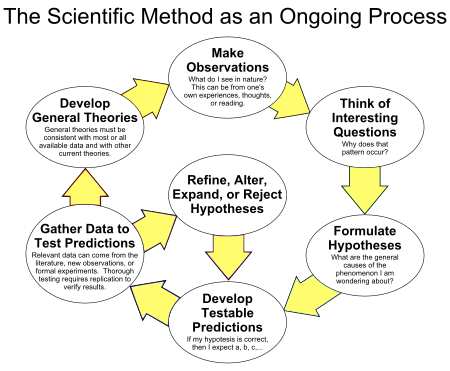Moses at the battle of Rephidim: “If I let my arms down, the other team will win!“
Friday, October 9, 2015 – Week 6 of the college football season started last night.
Which means that many or most fans around the country will be doing a bunch of weird rituals and/or superstitions, all to help their team win. (Or avoid jinxing their team, thus causing it to lose.) All of which may sound a bit weird to the more rational among us. (Which doesn’t necessarily exclude the aforementioned college football fans.)
 The thing is, this business of “helping your team win” has been around a long, long time. (Longer even than “Touchdown Jesus,” seen at left, visible from Notre Dame stadium …)
The thing is, this business of “helping your team win” has been around a long, long time. (Longer even than “Touchdown Jesus,” seen at left, visible from Notre Dame stadium …)
In fact, it may all have started with Moses, back at the battle of Rephidim, noted above. There’s more on that later, but first consider “Super”stitions: Fans engage in odd rituals:
[M]any sports enthusiasts have something they do in attempt to increase their team’s odds of winning. It’s possible that these wacky fan behaviors are related to the superstitious actions some athletes take in attempt to improve their luck … like growing beards or eating certain foods because they think the behavior is lucky. Adopting their own rituals is a way that fans can feel like they’re part of a team… “It all comes down to fan identification,” [Dr. Joshua Shuart] said. “They really feel that they’re part of the team.” (E.A.)
But what’s all this about Moses being the first guy who said “It’s only weird if it doesn’t work?”
For that we have to go back to Exodus 17, about 3,500 years ago. Like Pearl Harbor, the dreaded Amalekites launched a sneak attack on the Children of Israel, as they emerged from “the Exodus, at Rephidim near Mount Sinai.” Verses 8 to 16 tell of Israel pulling off an “upset of the season.” In essence they beat a hated arch-rival, thanks to Moses:
Moses, Aaron, and Hur went up to the top of the hill. Whenever Moses held up his hand, Israel prevailed; and whenever he lowered his hand, Am′alek prevailed. But Moses’ hands grew weary; so they took a stone and put it under him, and he sat upon it, and Aaron and Hur held up his hands, one on one side, and the other on the other side; so his hands were steady until the going down of the sun.
As noted elsewhere: “That sounds a lot like a modern-day football fan, watching his favorite team on TV.” Sometimes he moves around the room, sometimes he stands, sometimes he sits. Other times he’ll mute the sound on the TV, sometimes he’ll tell his wife to leave the room – because she may be jinxing his team – but he’s “always trying to ‘help his team win.’”
 Or in the case of Moses, his “team” starts winning when he holds his arms up, but they start losing if he lets his arms down…
Or in the case of Moses, his “team” starts winning when he holds his arms up, but they start losing if he lets his arms down…
So imagine Moses – today – watching the “battle” from a stadium seat, or on his TV set at home. For whatever reason, he holds his arms up, and his team scores a touchdown. But then his arms get tired. He lets his arms down for a moment and – lo and behold! – the other team scores a touchdown. So to help his team win – or avoid “jinxing” his team – Moses got his buddies Aaron and Hur to hold his arms up “for the rest of the game.”
That makes Moses the prototype of the modern-day football fan who does all kinds of strange things to help his team win. But here’s how one “skeptic” explained the phenomenon:
It’s a natural tendency for people to make connections between events. “When I do this, that happens…” Primitive people developed superstitions in similar ways. One year, the crops were bad. The next year, they put a basket of dead birds in the middle of the field, and everything turned out great. Therefore, placing a basket of dead birds in the field ensures a good crop… Like the primitive farmers, we continue to make assumptions of causation [which] leads us to think that prayer works (you pray for your sports team to win…) [But we should] not jump to conclusions. We should make multiple observations. We should try different sequences in various combinations… Even with all that, we might never be sure about the real causes. But we can rule some out, and … increase our confidence in others.
See Faulty logic: Post hoc, ergo . . . Gotham Skeptic. (Which apparently “no longer exists.”)
 On the other hand, you could just as easily say that such superstitions are a mass example of the scientific method: “a body of techniques for investigating phenomena, acquiring new knowledge, or correcting and integrating previous knowledge.” (What fool of a college football fan would keep doing things that ‘hurt” his team?) See also Thesis, antithesis, synthesis:
On the other hand, you could just as easily say that such superstitions are a mass example of the scientific method: “a body of techniques for investigating phenomena, acquiring new knowledge, or correcting and integrating previous knowledge.” (What fool of a college football fan would keep doing things that ‘hurt” his team?) See also Thesis, antithesis, synthesis:
The thesis is an intellectual proposition. The antithesis is simply the negation of the thesis, a reaction to the proposition. The synthesis solves the conflict between the thesis and antithesis by reconciling their common truths and forming a new thesis, starting the process over.
But the bottom line is this: “Athletes know it, fans know it, and even Bud Light knows it. Superstitions are as big a part of the game as anything. They were there when your parents and/or grandparents first started watching, and they’ll be here long after we’re gone.”
On the other hand, there’s the “pessimist” who wrote “It’s only weird if it doesn’t work:” the NEW worst slogan in the world. Among other things, he said in essence that such fan practices are all part of some axis of evil responsible for all the bad things that have happened in the world since Day One. (Which brings to mind Marty McFly’s “Lighten up, jerk!”)
Then too he wrote that such fan superstition is “ignorant, embarrassing, and frankly makes me a little pessimistic about humanity. Do you really think that wearing that unwashed jersey will help your team win?” To which I can only respond:
“Hey pal, tell that to Moses!”
* * * *

* * * *
The upper image is courtesy of Rephidim – Wikipedia, the free encyclopedia. The caption: “Moses holding up his arms during the Battle of Rephidim, assisted by Hur and Aaron, in John Everett Millais‘ Victory O Lord! (1871).”
The “Touchdown Jesus” image is courtesy of Gallery … University Of Notre Dame Touchdown Jesusimgarcade.com.
Re: positive outlook on life and/or “accentuating the positive.” Referring to “Ac-Cent-Tchu-Ate the Positive,” the 1944 song written by Harold Arlen with lyrics by Johnny Mercer.
See also curveball, defined in part as a “particularly difficult issue, obstacle, or problem.” The point being that life seems to have a habit of “throwing us curveballs.” See also the alternate definition of dinosaur, as “someone who resists change or is old-fashioned.”
Another note: The text of this post was gleaned from other posts in my first blog, Dorscribe.com, including On the readings for September 28, Reflections on a loss and “God’s Favorite Team” – Part I.
The “Touchdown Jesus” image is courtesy of Word of Life Mural // Hesburgh Libraries // University of Notre Dame. See also Notre Dame Stadium – Wikipedia, the free encyclopedia.
The “crossed fingers” image is courtesy of Why We’re So Superstitious | Psychology Today. That’s actually a pretty good – and non-biased – study of the phenomenon, which included this:
Sports fans, for all the ribbing they take, do have some decidedly positive mental health advantages over non-fans. Evidence cited by [Kent State University researcher Shana] Wilson and her co-workers supports the idea that fans who strongly identify with a team, particularly a local one, are less lonely, feel happier, and feel better about themselves.
The “SM” chart is courtesy of Scientific method – Wikipedia, the free encyclopedia.
The lower image is courtesy of Bud Light Only Weird – Image Results.
* * * *
Of related interest, see also Why Superstition Works: The Science of Superstition in Sports:
If you want to see some [sport superstitions], just go to a baseball game. Baseball players … are renowned for their superstitious behavior. Babe Ruth, famously, always touched second base when he came running in from the outfield… Over the years, players’ superstitious habits have become, if anything, even more extreme. Before each game, for instance, former Red Sox third baseman Wade Boggs … always practiced batting and wind sprints at the same time of day (5:17 p.m. and 7:17 p.m., respectively), left his house at the same time on game days, and drew the word “Chai” (Hebrew for “life”) in the dirt before coming up to bat (and Boggs isn’t Jewish). Likewise, All-Star slugger Jason Giambi had a cure for hitting slumps: gold lamé thong underwear, which must have been quite a sight in the locker room.
So what are you saying, “Mr. Pessimist?” That Babe Ruth and Wade Bogs are evil? Hah?
